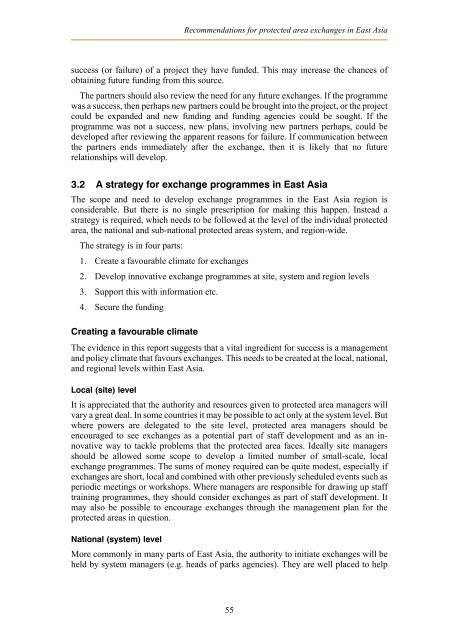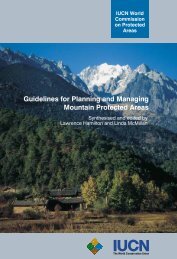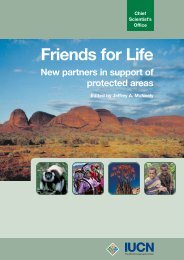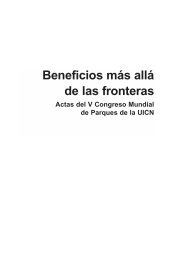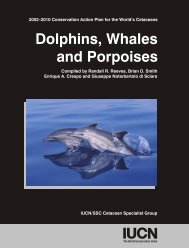Exchange programmes - IUCN
Exchange programmes - IUCN
Exchange programmes - IUCN
Create successful ePaper yourself
Turn your PDF publications into a flip-book with our unique Google optimized e-Paper software.
success (or failure) of a project they have funded. This may increase the chances of<br />
obtaining future funding from this source.<br />
The partners should also review the need for any future exchanges. If the programme<br />
was a success, then perhaps new partners could be brought into the project, or the project<br />
could be expanded and new funding and funding agencies could be sought. If the<br />
programme was not a success, new plans, involving new partners perhaps, could be<br />
developed after reviewing the apparent reasons for failure. If communication between<br />
the partners ends immediately after the exchange, then it is likely that no future<br />
relationships will develop.<br />
3.2 A strategy for exchange <strong>programmes</strong> in East Asia<br />
The scope and need to develop exchange <strong>programmes</strong> in the East Asia region is<br />
considerable. But there is no single prescription for making this happen. Instead a<br />
strategy is required, which needs to be followed at the level of the individual protected<br />
area, the national and sub-national protected areas system, and region-wide.<br />
The strategy is in four parts:<br />
1. Create a favourable climate for exchanges<br />
2. Develop innovative exchange <strong>programmes</strong> at site, system and region levels<br />
3. Support this with information etc.<br />
4. Secure the funding<br />
Creating a favourable climate<br />
The evidence in this report suggests that a vital ingredient for success is a management<br />
and policy climate that favours exchanges. This needs to be created at the local, national,<br />
and regional levels within East Asia.<br />
Local (site) level<br />
It is appreciated that the authority and resources given to protected area managers will<br />
vary a great deal. In some countries it may be possible to act only at the system level. But<br />
where powers are delegated to the site level, protected area managers should be<br />
encouraged to see exchanges as a potential part of staff development and as an innovative<br />
way to tackle problems that the protected area faces. Ideally site managers<br />
should be allowed some scope to develop a limited number of small-scale, local<br />
exchange <strong>programmes</strong>. The sums of money required can be quite modest, especially if<br />
exchanges are short, local and combined with other previously scheduled events such as<br />
periodic meetings or workshops. Where managers are responsible for drawing up staff<br />
training <strong>programmes</strong>, they should consider exchanges as part of staff development. It<br />
may also be possible to encourage exchanges through the management plan for the<br />
protected areas in question.<br />
National (system) level<br />
Recommendations for protected area exchanges in East Asia<br />
More commonly in many parts of East Asia, the authority to initiate exchanges will be<br />
held by system managers (e.g. heads of parks agencies). They are well placed to help<br />
55


